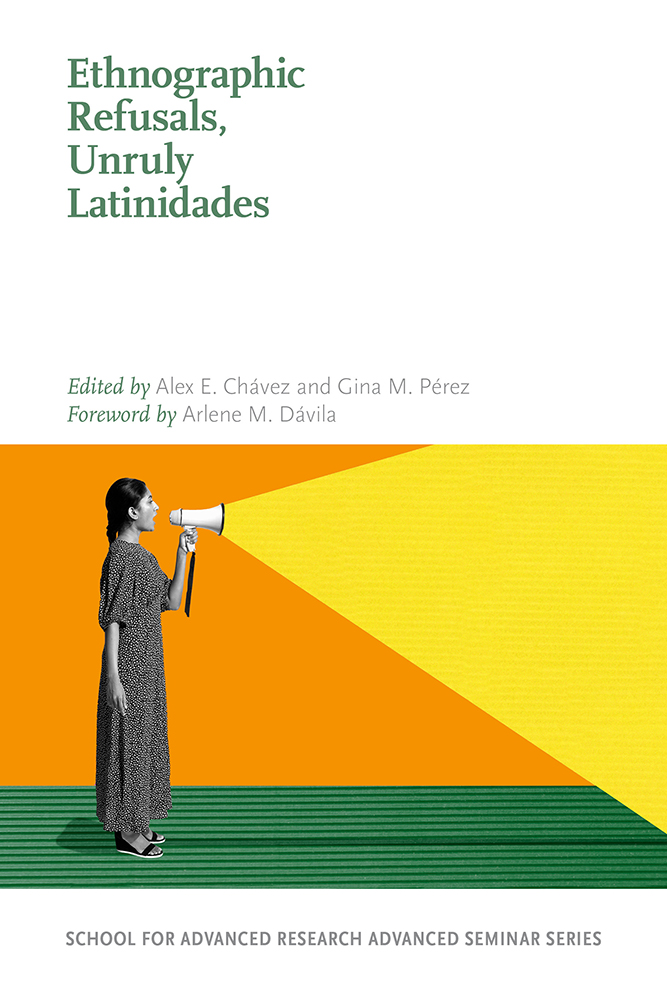Ethnographic Refusals, Unruly Latinidades
Edited by Alex E. Chávez and Gina M. Pérez, with a foreword by Arlene M. Dávila
The contributors to this volume highlight the value of radical inclusion in their research and call for a critical self-reflexivity that marshals the power of bearing witness to move from rhetoric to praxis in support of these methodologies within anthropological perspectives. Their essays do not offer simple solutions to histories of colonialism, patriarchy, and misogyny, through which gender binaries and racial hierarches have been imposed and reproduced, but rather provide a crucial opportunity for reflection on and continued reimagination of the contours of Latinidad. These scholars deploy Latinx strategically as part of ongoing dialogues, understanding that their terminologies are inherently imprecise, contested, and constantly shifting. Each chapter explores how Latinx ethnographers and interlocutors work together in contexts of refusal—ever mindful of how power shapes these encounters and the analyses that emerge from them—as well as the extraordinary possibilities offered by ethnography and its role in ongoing social transformation.
2022. 280 pp., 6 x 9, 12 halftones
Contributors: Ana Aparicio, Andrea Bolivar, Alex E. Chávez, Arlene M. Dávila, Vanessa Díaz, Sherina Feliciano-Santos, David Flores, Santiago Guerra, Sergio Lemus, Ryan Mann-Hamilton, Gina M. Pérez, Jonathan Rosa, Gilberto Rosas, Aimee Villarreal, and Patricia Zavella
Download an excerpt.
“The contributors brilliantly explore Latinx struggles—from trans-rights and reproductive justice to asylum proceedings—while questioning and transforming the anthropological enterprise through unruly refusals. The volume engages a series of innovative concepts to frame this wider project, including poderosa, necro-subjectification, vendidx, fantasia, and trash talk, while challenging current understandings of citizenship/non-citizenship, place, resistance, mestizaje, and culture. This magnificent volume outlines new strategies for decolonizing anthropology, producing engaged scholarship, and analyzing possibilities for a more just and equitable future. It will inspire future generations of academics.”
—Miguel Díaz-Barriga, co-author of Fencing in Democracy: Border Walls, Necrocitizenship, and the Security State
Foreword
Arlene M. Dávila
Introduction
Ana Aparicio, Andrea Bolivar, Alex E. Chávez, Sherina Feliciano-Santos, Santiago Guerra, Gina M. Pérez, Jonathan Rosa, Gilberto Rosas, Aimee Villarreal, and Patricia Zavella
Chapter One. “While You Are Struggling, You Are Healing”: Latinas Enact Poder through the Movement for Reproductive Justice
Patricia Zavella
Chapter Two. Taíno and Afro-Taíno Narrative, Performance, and Resistencia in Puerto Rico and the United States
Sherina Feliciano-Santos
Chapter Three. The Urban Sonorous and Collective Witness in the City of Neighborhoods
Alex E. Chávez
Chapter Four. Diasporic Signs: Puerto Rican Placemaking, Latinx Artivism, and the Aesthetics of Resistance
Jonathan Rosa and David Flores
Chapter Five. Race, Trash Talk, and Dissent in Contemporary Suburbia
Ana Aparicio
Chapter Six. Trans Latina Fantasías: Creating Trans Latina Selves, Families, and Futures
Andrea Bolivar
Chapter Seven. The Drug War, Drug Reform, and the Latinx Community: An Ethnographic Perspective from the Texas-Mexico Border and Colorado
Santiago Ivan Guerra
Chapter Eight. Becoming a Sanctuary People: Latina/o Practices of Accompaniment in Northeast Ohio
Gina M. Pérez
Chapter Nine. Witnessing in Brown: On Making Dead to Let Live
Gilberto Rosas
Chapter Ten. Anthropolocura as Homeplace Ethnography
Aimee Villarreal
Afterword. Uncertain Future(s): Latinidad, Anthropology, Institutions
Vanessa Díaz, Sergio Lemus, and Ryan Mann-Hamilton
References
List of Contributors
Index
- Acequia: Water Sharing, Sanctity, and Place, by Sylvia Rodríguez, 2006
- Otros Saberes: Collaborative Research on Indigenous and Afro-Descendent Cultural Politics, edited by Charles R. Hale and Lynn Stephen, 2014
- The Psychology of Women under Patriarchy, edited by Holly F. Mathews and Adriana M. Manago, 2019
- Trumpism, Mexican America, and the Struggle for Latinx Citizenship, edited by Phillip B. Gonzales, Renato Rosaldo, and Mary Louise Pratt, 2021
- Walling In and Walling Out: Why Are We Building New Barriers to Divide Us?, edited by Laura McAtackney and Randall H. McGuire, 2020
- Sounds of Crossing: Music, Migration, and the Aural Poetics of Huapango Arribeño, by Alex E. Chávez, Duke University Press, 2017
